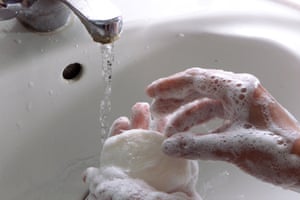More than 500 care providers in the UK, including 19 hospitals and other NHS facilities, have failed hygiene and food safety inspections, Guardian analysis reveals.
Food Standards Agency (FSA) data shows that care homes fail to meet food hygiene standards more than any other type of care provider, with more than 200 residential, nursing and care homes receiving low grades at their latest food safety inspections.
This was closely followed by nurseries, childcare centres, playgroups and out-of-school care providers, more than 200 of which failed to meet hygiene standards, as well as a handful of hospices, homeless shelters, churches and youth centres.
The FSA ranks all food providers, giving them a score of zero to five. Zero means the establishment “urgently requires improvement”, one or two is considered a failing grade, and three to five is satisfactory.
An overwhelming majority (more than 98%) of hospitals and other care providers achieve a food hygiene rating of three or better. Despite this overall success, Michael Harding, a food hygiene rating scheme support officer at the FSA, said any instance of a care organisation receiving a low score was “a cause for concern”, due to the fact that vulnerable people, including children, older people and people who are ill, were more likely to use their services.
“The food safety officer will be taking the necessary action to ensure that the issues identified at caring premises with a lower rating are addressed and that vulnerable people are not put at risk,” he said.
Eight care providers still in operation scored zero, including six residential care homes, one nursery and one after-school care facility, which has since stopped preparing food for children.
A ninth, Fairy Tales day nursery in Glen Parva, Leicestershire, received a score of zero in May after inspectors found a mouse infestation. The nursery closed and has since reopened under new management. The new business is yet to be inspected, but a spokesman from Blaby district council, which conducts inspections in the area, said Ofsted visited the site in mid-August and confirmed that it was clean and tidy with no evidence of mice.
The Stay and Play after-school care service at Millbrook primary school in Newport, south Wales, scored a zero rating in June after it provided high-risk food, such as ham and salad wraps, despite not having the facilities to safely prepare them, Newport city council’s environmental health team said. The centre has since stopped serving food that requires preparation and gives children cereal or biscuits instead.
Several care homes were given zero ratings for issues including mouldy and expired food found in fridges, evidence of cross-contamination between raw and cooked food, lack of hand-washing facilities, poor cooking equipment and no food safety management documentation.
Businesses awarded a zero rating are either immediately shut down or given 28 days to tackle urgent issues, with visits to check that work has been carried out. They can then either pay £160 to be rescored or wait until their next scheduled assessment, usually about six months later, to potentially be given a new score.
Nineteen hospitals nationwide received scores of between zero and two, or “improvement required” in the case of Scotland, which uses a different grading system.

According to the FSA, the hospital inspections look at meals served in canteens as well as those served to patients, but do not cover independent retailers based at hospitals, which are inspected separately.
In almost all cases, spokespeople for the low-scoring hospitals and the councils that inspected them said the hospital administrations had taken steps to improve food safety.
Eight hospitals in Scotland received the grade of “improvement required”, in some cases because of repeated minor contraventions, such as chipped plaster on kitchen walls, water damage on floor coverings and the lack of a thermometer to monitor fridge temperatures.
One of these hospitals, Albyn hospital in Aberdeen, a 30-bed private hospital run by BMI Healthcare, received a rating of “improvement required” in May, with the food safety inspector citing issues with cleanliness, temperature control and paperwork. The inspector also mentioned concerns with cross-contamination from the storage of raw and cooked foods together, use of the same aprons by staff throughout the day and in particular the use of the same machine to vacuum-pack raw food, such as sausages, and cooked food, such as chicken and smoked salmon.
“I am extremely concerned that … the vacuum packer was being used for ready-to-eat foods,” the inspector wrote in their report. “Your customers are patients of the hospital and as such have heightened vulnerability and may be immunocompromised [have a weakened immune system].”
Stuart Storrie, the interim executive director of BMI Healthcare, said that since the inspection the company had worked with suppliers and staff to “correct every single one of the problems cited in the report” and he was confident they had addressed all issues raised.
Two hospitals in Birmingham received failing grades at their inspections in March. The Royal Orthopaedic and West Heath hospitals were awarded scores of two and one respectively.
The catering company that prepares food for two units at Kingsley Green’s NHS site in Shenley, Hertfordshire – Oak unit, a 10-bed psychiatric intensive care facility, and Beech unit, a 15-bed rehabilitation ward – received a score of one in December 2015. Another inspection of the wards was imminent, St Albans city and district council said.
An NHS eating disorder unit in Stockton-on-Tees was given a score of one in March 2015. The facility runs shopping and cooking workshops with clients, and an inspection found that during these activities, there were problems with food hygiene, such as hand washing and not wearing aprons.
A spokesperson for the NHS trust said that since the inspection, it had had further talks with inspectors and put in place “robust actions” to improve food safety.
Hospitals and care homes fail food safety inspections
Hiç yorum yok:
Yorum Gönder